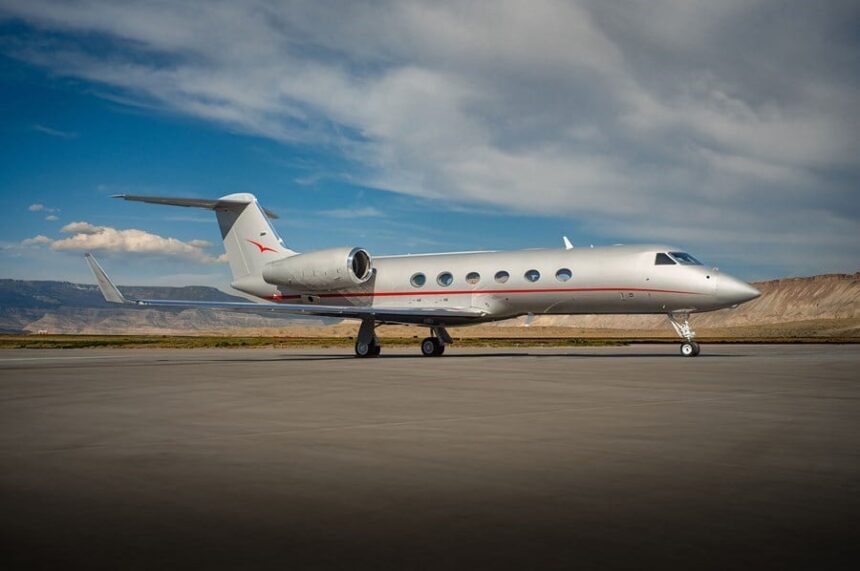VistaJet has become the first foreign private jet company licensed to run domestic flights in Saudi Arabia, a move that comes as the Kingdom’s aviation sector undergoes major change under Vision 2030.
Chairman and founder Thomas Flohr spoke with Al Arabiya English presenter Tom Burges Watson about what the approval means for both the company and the country.
Flohr said the demand for private aviation within Saudi Arabia was already clear.
“We’re extremely excited to serve our new and existing clients. With our global fleet, we have the infrastructure, we have the operations in place to immediately start serving. We actually already had our first flights in the country on the back of the first half of 2025, we saw a 32% increase in our program members in the kingdom year-on-year and that’s kind of like highlighting the demand for both domestic and global flying coming from the country.”
How VistaJet’s membership works
According to Flohr, customers don’t need to own an aircraft or a share of one.
“Rather than having to buy an airplane or a fraction of an airplane, they just buy the hours they need. It’s a three-year subscription and they buy as many hours on whichever airplane serves them best and they can use them anywhere in the world. It allows having access to our fleet of approximately 250 aircraft no matter where and within short notice.”
What it means for Saudi Arabia
Flohr said the company’s arrival gives local customers access to the same service standards it has built up globally.
“It really brings the quality of operation that VistaJet has established for more than 20 years on every continent around the world. We can now offer the exact same operational and service quality that we do anywhere else in the world. It’s our international clients that can now continue to use VistaJet within the country.
“And it’s of course our very loyal and long-term Saudi client base that we have that can now use us within the country. And obviously we’re very excited to welcome a whole lot of new clients being at large corporations or ultra high net worth individuals, family offices that can join the VistaJet program.”
Middle East market trends
Flohr described the region as one of the fastest-growing for private aviation.
“The Middle East is booming and we see significant growth. The market share in the Middle East is taking over the global market share so we’re seeing a significant uptick in demand.
“Our Global 7500 fleet that we have, 18 of those aircraft, is very much suited extremely well for the Middle East because this aircraft can take you non-stop to pretty much any point on the planet and where the Middle East is geographically very helpful.
“So see business leaders from any region coming into any continent coming into the Middle East and flying back very often on very short trips. They’re always stressed for time and that’s where the flying offices we call it with the highest speed internet available allows them to be so efficient conduct the business and and come back rested given the sleep experience the low cabin pressure al that we have in our in our aircraft.”
Any IPO or investment plans?
Despite speculation about new financing, Flohr said the company has no immediate plans for an IPO.
“We’re a private company as you know. I still own about 85%. We’ve just recently done capital market transactions earlier this year between equity and some amazing debt financing of about 1.3 billion. So at this point in time we’re very happy with the capital structure that we have. So right now, no plans.”
Hiring locally
Flohr confirmed that VistaJet has already been recruiting in the Kingdom.
“We have been hiring in anticipation. Our leader from a sales point of view for many years is actually Saudi [President for VistaJet’s operations in the Middle East, Mazen Obaid]. So we have an advantage right there and we’re an attractive place to work for. So, we’ll continue to add to our sales force, continue to add to our operational infrastructure as the demand will be growing for our local operations.”
Routes and demand
Flohr said demand is strongest between Saudi Arabia’s major cities, though business flights to smaller airports are also expected.
“It’s definitely between the main cities in Saudi, but there are some smaller airfields and smaller areas where, you know, either investors or or business people need to get to very efficiently, maybe only stay for 24 hours and fly straight back to Riyadh or Jeddah. It’s exactly that what we’re serving within the country making it so much more palatable and easy to use private jets within the country.”
Setting up in Saudi Arabia
Flohr described the licensing process as straightforward and transparent.
“It has been an incredibly pleasant experience to work with the Saudi leadership in this process. It’s a normal process that we had to go through. There is a lot of diligence. There is a lot of detailed understanding exactly how we operate and that has been done in an extremely transparent way and obviously we’re extremely pleased to have been aboarded the license to fly within the country and now serve the country with our fleet — the famous silver with a red stripe fleet and its service standards that we offer already everywhere else in the world.”
















